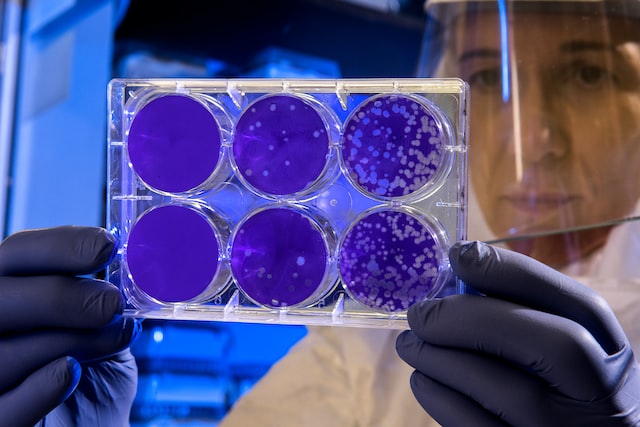Office Germ Hotspots Revealed
New research by leading international brand of professional cleaning materials Chicopee has revealed the germ hotspots in Britain’s offices. COVID-19 and...
Read Full Article
New nanocoatings applied to door openers on trains and buses, key pads on cash machines and door handles in doctors’ surgeries could help to stop the spread of viruses and bacteria.
As highlighted during the recent pandemic, surfaces and touchpoints in such highly frequented areas can promote transmission of viruses or bacteria with dangerous consequences, especially for older people, small children and those with previous illnesses. Processes and products were developed and evolved to manage this over the last few years, including fogging, UV light devices and antibacterial coatings and films – common handles were also fully re-materialised with this in mind.
Touchless systems were adopted in many circumstances, such as for Vodafone's visitor management and HappyOrNot's feedback units.
"In our project, we want to combine modern nanotechnologies with innovative materials to develop surface coatings that protect us from pathogens that are mainly transmitted via surfaces."
– Prof. Artemis Stamboulis
University of Birmingham
Now, nanocoatings applied to surfaces should restrict these transmission routes in the future, thanks to an EU research project led by Bundesanstalt für Materialforschung und -prüfung (BAM) and the University of Birmingham.
The project - involving 15 European partners from industry and academia - is developing nanocoatings that should prevent contact infections via surfaces and thereby increase health protection.
Researchers are developing various substances that enable highly flexible and durable coatings, have a broad spectrum of antiviral and antimicrobial properties and avoid the development of resistance. "Outbreaks of highly infectious pathogens such as noroviruses, E. coli or methicillin-resistant Staphylococcus aureus (MRSA) have shown how important it is to interrupt transmission chains," says Dr Frank Schreiber, coordinator of the project at BAM.
"In our project, we want to combine modern nanotechnologies with innovative materials to develop surface coatings that protect us from pathogens that are mainly transmitted via surfaces," adds project coordinator Prof. Artemis Stamboulis from the University of Birmingham.
The researchers’ focus is on nanoparticles and antimicrobial peptides - protein molecules that are also naturally produced by living organisms to defend themselves against bacteria. In addition, the experts will investigate whether the antiviral and antibacterial effects can also be achieved via nanoscale surface modifications of high-touch materials - combining nano-structures with chemical modifications to enable even better protection.
Experts will test the efficacy of the nanocoatings both in the laboratory and under real-world conditions, for example in nursing homes.
They will develop new test methods, which then should lead to new standards for antiviral and antibacterial testing of high-touch materials. In addition, the researchers will investigate the safety aspects of nanomaterials through detailed studies on human and environmental toxicity and life cycle analyses. The project will run until August 2026 and the first results are expected in February 2024.
Picture: a scientist reviewing bacteria samples in petri dishes. Image credit: Unsplash.
Article written by Bailey Sparkes | Published 20 October 2022
New research by leading international brand of professional cleaning materials Chicopee has revealed the germ hotspots in Britain’s offices. COVID-19 and...
Read Full ArticleScreenworks’ Bumpaa ViralOff® Shield spray has passed independent testing using the ISO method on COVID-19. The product is intended to redefine the way we...
Read Full ArticleThe EnviroKlenz Air System is used to ensure clean air in a variety of high traffic environments, such as dentistry studios and school classrooms. According to...
Read Full ArticleA desktop monitor stand with a built-in sanitation compartment complete with fully contained UV LEDs is to launch at this year's Facilities Show Connect...
Read Full ArticleIn this interview, we join Cody Stahl from EnviroKlenz to discuss their dynamic approach to indoor air quality. EnviroKlenz are a USA born purification...
Read Full ArticleResearch from a smart hand sanitiser technology company shows that just one in five people cleanse their hands correctly. Additionally, 33 per...
Read Full ArticleAs we approach a year since the UK entered its first lockdown, how has the facilities management industry supported businesses to adapt and remain safe throughout the...
Read Full ArticleMany have been led to believe that hand sanitising solutions with high alcohol content are the safest method of stopping COVID-19 transmission, but what about the...
Read Full ArticleThe safety of children and vulnerable adults could be at risk due to the wave of under-regulated alcohol-based hand sanitisers on the market. According to...
Read Full ArticleA sanitising product used by Transport for London and American Airlines has had several virus-killing claims questioned by an Australian news service. Zoono Group,...
Read Full Article